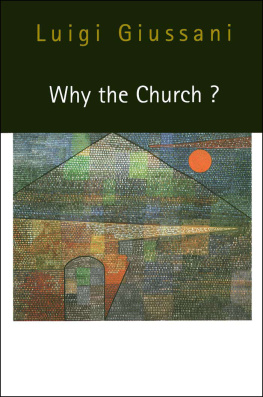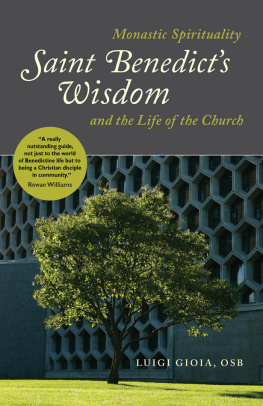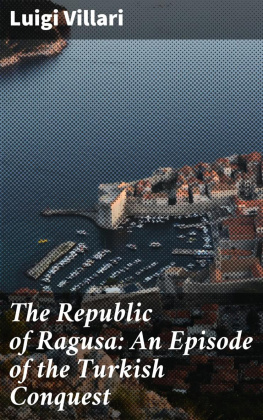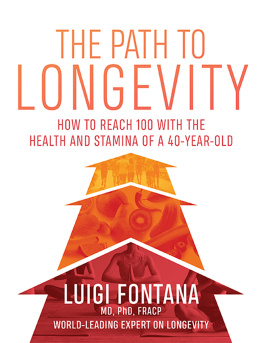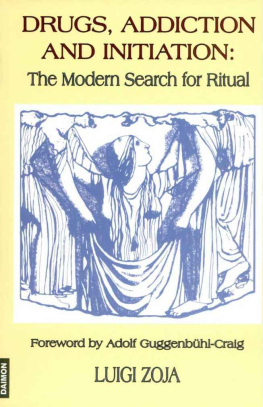Luigi Giussani - Why the Church?
Here you can read online Luigi Giussani - Why the Church? full text of the book (entire story) in english for free. Download pdf and epub, get meaning, cover and reviews about this ebook. year: 2001, publisher: MQUP, genre: Religion. Description of the work, (preface) as well as reviews are available. Best literature library LitArk.com created for fans of good reading and offers a wide selection of genres:
Romance novel
Science fiction
Adventure
Detective
Science
History
Home and family
Prose
Art
Politics
Computer
Non-fiction
Religion
Business
Children
Humor
Choose a favorite category and find really read worthwhile books. Enjoy immersion in the world of imagination, feel the emotions of the characters or learn something new for yourself, make an fascinating discovery.
- Book:Why the Church?
- Author:
- Publisher:MQUP
- Genre:
- Year:2001
- Rating:3 / 5
- Favourites:Add to favourites
- Your mark:
- 60
- 1
- 2
- 3
- 4
- 5
Why the Church?: summary, description and annotation
We offer to read an annotation, description, summary or preface (depends on what the author of the book "Why the Church?" wrote himself). If you haven't found the necessary information about the book — write in the comments, we will try to find it.
Why the Church? — read online for free the complete book (whole text) full work
Below is the text of the book, divided by pages. System saving the place of the last page read, allows you to conveniently read the book "Why the Church?" online for free, without having to search again every time where you left off. Put a bookmark, and you can go to the page where you finished reading at any time.
Font size:
Interval:
Bookmark:
Why the Church?
From its beginnings, the Church has presented itself as a human phenomenon that carries the divine within it. As a social fact, its reality given form by men and women, the Church has always affirmed that its existence surpasses the human reality of its components and that it stands as the continuation of the event of Christs entry into human history. Why the Church?, the final volume in McGill-Queens University Presss trilogy of Luigi Giussanis writings, explores the Churchs definition of itself as both human and divine and evaluates the truth of this claim.
Giussani begins by focusing on the Church as a community composed of people who are aware of themselves as defined by the gift of the Spirit, from which they derive a new conception of existence, the fruit of conversion. He then describes the Churchs developing self-awareness of its dual elements of the human and divine. Concerned with verifying the Churchs claim to embody Christ, Giussani situates the locus of verification in human experience, arguing that a different type of life is born in those who try to live the life of the Church.
Why the Church? is a seminal study that will engage both the scholar and the general reader.
LUIGI GIUSSANI is professor emeritus of the Universita Cattolica del Sacro Cuore in Milan, Italy, and is the founder of the Catholic lay movement Communion and Liberation, which is flourishing in Italy and has spread to over sixty countries throughout the world, including Canada, the United States, and Britain.
LUIGI GIUSSANI
Translated by Viviane Hewitt

McGill-Queens University Press 2001
ISBN 07735-16549 (cloth)
ISBN 07735-17073 (paper)
Legal deposit first quarter 2001
Bibliothque nationale du Qubec
Printed in Canada on acid-free paper
McGill-Queens University Press acknowledges the financial support of the the Government of Canada through the Book Publishing Industry Development Program ( BPIDP ) for its activities. It also acknowledges the support of the Canada Council of the Arts for its publishing program.
Canadian Cataloguing in Publication Data
Giussani, Luigi
Why the church?
Translation of: Perch la Chiesa?
Includes bibliographical references and index.
ISBN 07735-16549 (bound)
ISBN 07735-17073 (pbk.)
I. Church. I. Hewitt, Viviane II. Title.
BR 145.2 G 58 2001 262.7 C 00900898-5
Typeset in 10/12 FFScala by Acappella
Jesus Christ continues his presence and his work of salvation in the Church and through the Church, which is his Body. These words by Cardinal Ratzinger, contained in the latest document issued by the Congregation for the Doctrine of the Faith (Dominus Iesus), introduce us to the contents of this volume which, in an ideal sense, conclude the trilogy begun with The Religious Sense and continuing with At the Origin of the Christian Claim.
The logic of Why the Church? becomes clear when we understand the lengthy premise which places the problem within its true terms: The Church offers itself as the continuity of Christ. How can the Church be recognized as this continuity? The introduction presents, with basic clarity, the problem of how this recognition can come about: through historical texts (as maintained by rationalism), by inner enlightenment (as Protestantism maintains), or (according to the Orthodox-Catholic formulation) by the working of Christs spirit: the mystery of the communion of believers. This third way since we always begin with the present moment provides, precisely through the present experience in which we participate, the solution to the question of the historical reading of texts and the movement of the Spirit which we need in order to understand who is standing before us.
Why is it so hard to admit this road, which seems to be the easiest? The difficulty lies in the triumph of rationalism, which maintains that the truth of reality is what can be measured by reason or observed by experience in the naturalistic sense of the term. This is reason understood as the measure of all things, a concept which limits its value because it deprives it of its capacity to be open to Mystery and to be fortified by the workings of Grace. The triumph of this rationalism is explained by adopting literally the formulation given by Henri Daniel-Rops in his induction speech to the Academie Franaise in 1955 (see pp. 589). This dominion of rationalism is described in its slow historical process of affirmation, beginning with the rupture of the unity of the conception of the self and the world which was ensured in the Middle Ages by a human reason open to faith.
This long introduction is not a dense cultural theorization. Rather, it describes the effort our soul makes in living the relationship with God and with Christ every day. The central idea is that only by starting from present experience can humans read any past with accuracy. This is an extremely important principle which is easily understood. Christ, knowing that the beginning for human beings is the present, became present in order to be understood in his origin in the mystery of Christian communion, in the mystery of the Mystical, that is to say mysterious, Body of Christ. Therefore, it is in an experience of companionship that human beings can penetrate the darkness of the past and discover the light that was already present in it.
This idea then is developed in three parts. The first part presents a concise, simple evaluation of the historical information contained in the Gospels, drawing from it the principal categories of the fact of the Church as such, and discussing the Christian event with certain characteristics that are so elementary as to be axiomatic. (The discovery some years ago of a fragment that in all probability belongs to the Gospel of Mark and can be dated around 50 AD makes us more aware of the contemporaneity with Christ of the historical data.)
What then, are the basic factors of the Christian event which emerge from the texts? They are
a community,
comprised of people who are aware that what brings them together is determined by the gift of the Spirit,
from which derives a new kind of life, a new conception of existence, which is the fruit of a metanoia.
The second part describes the terms of development in history of this communitys self-awareness, a self-awareness that the Church has of itself in all times in an explicit and mature form: the fact of being composed of the human and the divine. This part is extremely important from the dialectical point of view. No objections are possible, because everything that is deviant, in terms of human nature and actions, can be contained within the Church because it is made up of human beings. However, at the same time, it is the bearer of a reality that is not human. And this divine reality is expressed both as knowledge (Dogma) and constructive energy (Grace). By this new self-awareness and this new capacity for action, in the Church things become possible which would otherwise be impossible either to understand or to do. By human resources it is impossible, but not for God; because for God everything is possible (Mark 10:27).
The third part answers this question: How can we be sure that what the Church claims as the contents of its self-awareness and its capacity for human fulfillment is true? We could answer immediately that there is
Next pageFont size:
Interval:
Bookmark:
Similar books «Why the Church?»
Look at similar books to Why the Church?. We have selected literature similar in name and meaning in the hope of providing readers with more options to find new, interesting, not yet read works.
Discussion, reviews of the book Why the Church? and just readers' own opinions. Leave your comments, write what you think about the work, its meaning or the main characters. Specify what exactly you liked and what you didn't like, and why you think so.

